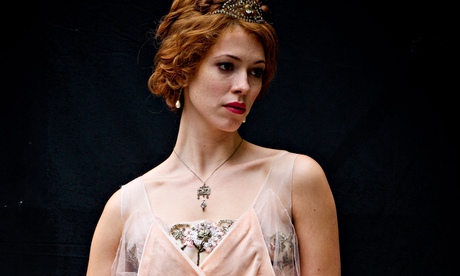
Has there ever been a more toxic marriage than the one at the centre of Ford Madox Ford’s four-volume Parade’s End? The disastrous relationship between Christopher and Sylvia Tietjens is hard to take for the reader, let alone the two principals themselves. Unfortunately, Christopher – the most brilliant man in England and the last true gentleman, if you believe Ford – holds the calamitous view that: “No one but a blackguard would ever submit a woman to the ordeal of divorce.”
Sylvia is Roman Catholic, and though hardly holding to the tenets of her own religion (or any other), she will not contemplate divorce herself. (This changes late on in the books, with a complex legal move, but even her own lawyer “knew that Sylvia’s aim was not divorce but the casting of all possible obloquy on Christopher.”)
It is her wickedness that holds her in the marriage: she enjoys making Christopher’s life a misery. This is how her husband remembers her when they are apart:
Very tall; fair; as graceful, as full of blood and as cruel as the usual degenerate Derby winner. Inbred for generations for one purpose: to madden men of one type …
To start with, she makes him marry her with a pregnancy that she believes to be nothing to do with him – in Ford’s words, she “trepans” (meaning “traps”) him. She runs off for an adventure with the inadequate Major Perowne, and then informs her husband that she is coming back “though she had no gratitude to Tietjens for taking her back and nothing but repulsion for the idea of living in his house”. Shortly after this she throws her lunch at his head, mostly because she is bored.
While he is bravely fighting in the trenches during the first world war, she travels to France, without proper papers, to cause trouble for him – which she wholly succeeds in doing. Tietjens is sent to the frontline and almost-certain death, instead of the safer role he deserves, because of Sylvia’s meddling, and because there are men who love her, and hate her husband. (It is not entirely her fault, and Tietjens survives.) The male characters in the book divide into those who think her rather wonderful, and those who see her for what she is. Is it possible John le Carré read this book before creating Lady Ann Smiley, the wife of George? – a similar character though not nearly so wicked.
Sylvia goads and infuriates Christopher, and their relationship is horrible but all too real and imaginable – two people trapped together and driving each other mad. In her defence, Christopher is a passive-aggressive nightmare. He is snobbish and pompous, and very unromantic. Sylvia says he holds eugenicist views. He says he has “not got a friend in the world”.
Sylvia’s villainy is endlessly imaginative and, it should be said, rather stylish: At one point she retires to a convent and announces that she is dying of cancer – a complete lie, simply another vicious attempt to make life difficult for Christopher. She entertains at her fake deathbed, and says: “You never saw anything so ravishing as me amongst the lilies and the teacups with the great crucifix above my head.” Later, she stages a cure: “Well, I wasn’t going to stop in bed … all my life.”
The brilliance of Ford lies in the way in which he makes what could be a melodramatic farce into a real relationship – an awful one, but wholly believable. Sylvia does love Christopher, but wants something from him that he cannot give her – yet, as she says herself, part of the problem is that, after Christopher, she finds all other men boring. As she also tells him:
“If you had once in our lives said to me: ‘You whore! You bitch! You killed my mother. May you rot in hell for it …’ If you’d only once said something like it … about the child! About Perowne! … you might have done something to bring us together …”
Three books later, after the war, Sylvia is inexhaustible: still poking around in Christopher’s life and making difficulties, turning others against him. She masterminds the felling of the very important Great Tree of Groby at the Tietjens’ ancestral home – it’s hard for the reader to take this all that seriously, and even Ford and Christopher eventually see that it is is going to mean a new start for everyone, and might be a good thing. Then in the end she draws back from a final death-blow to Christopher and his new love, Valentine, though I found it a little unconvincing when she says: “As God is my Saviour I would not tear another woman’s child in the womb!” This reader believes she knows the character better than the author, and refuses to accept the softening.
Sylvia is a real human being, and as such an asset in a canon too full of saintlier types. As Gillian Flynn, author of another novel about a toxic marriage, Gone Girl, put it: “the one thing that really frustrates me is this idea that women are innately good, innately nurturing. In literature, they can be dismissably bad – trampy, vampy, bitchy types – but there’s still a big push back against the idea that women can be just pragmatically evil, bad and selfish.” You can’t dismiss Sylvia. She is Ford’s greatest creation.

